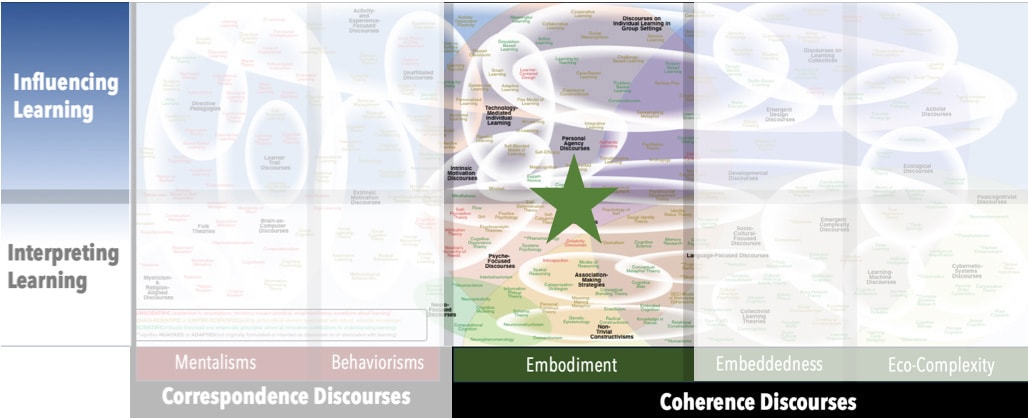Focus
Being totally absorbed by a taskPrincipal Metaphors
- Knowledge is … scope of possible activities
- Knowing is … flow (having sufficient skills to complete a demanding task effortlessly)
- Learner is … an engager (individual in action)
- Learning is … developing skills
- Teaching is … N/A
Originated
1980sSynopsis
Flow – or a “flow state” – is characterized by intense concentration on an achievable goal or task with deep, yet effortless immersion. A Flow state is an energizing and pleasurable experience during which one might lose awareness of one’s sense, surrounding, and perhaps even time. Flow is dependent on tasks that promise success, offer immediate feedback, and afford autonomy. Various models have been proposed, most of which highlight that Flow can happen when high “skill” meets high “challenge” – as illustrated in these examples: Associated notions include:
Associated notions include:
- Deep Concentration (Focused Attention; State of Flow) — the mental state associated with being fully immersed in, focused on, and absorbed by a particular activity
- Deep Work (Cal Newport, 2010s) – focused, distraction-free work that pushes thinking abilities to their limit, producing valuable results efficiently. Deep Work contrasts with shallow, fragmented tasks and is essential for mastering complex skills and achieving high productivity in a world full of constant distractions
- Goldilocks Task (Goldilocks Principle) – an activity that, following the children’s story after which it is named, is “just right” – that is, not too easy, not too difficult, but engagingly challenging for the learner. The notion is associated with many discourses, including Flow (where it is associated with the white regions in the above graphics), Affordance Theory, and the Zone of Proximal Development (under Socio-Cultural Theory).
- Gear 1 – a stage of low arousal and minimal focus associated with warm-up or recovery. Gear 1 involves gaining awareness of the task or situation, building momentum through simple or habitual actions.
- Gear 2 – a stage of moderate engagement and active focus associated with optimum performance in challenges settings. In Gear 2, effort and attention are heightened enabling one to take on tasks that require more active problem-solving, creativity, or energy without feeling overwhelmed. (Gear 2 has been associated with the “flow state.”)
- Gear 3 – a stage of high engagement, maximum effort, and – often – excessive activation. Gear 3 is associated with high physical and/or cognitive demands, and it may be experienced as debilitating in some instances.
Commentary
Flow describes a state of absorption in a task, but it does not offer suggestions for how to enter it. The theory makes broad and largely unsubstantiated claims of how experiencing Flow leads to happiness and otherwise improves one’s life. Flow also does not take into account any social aspects of learning. Commentators familiar with Eastern philosophy have highlighted that the concept – introduced to Western thought in the 1970s – has been a core component of most wisdom traditions for millennia.Authors and/or Prominent Influences
Mihaly CsikszentmihályiStatus as a Theory of Learning
Flow is not a theory of learning, as it does not offer new insight into the complex dynamics of learning. Flow is more of a psychological theory of mental states.Status as a Theory of Teaching
Flow is not a theory of teaching, yet, it has been integrated into education as a desirable state for learners’ engagements. The theory does not provide insights into how to set conditions for absorption into tasks. Some evidence has been generated to show that some teaching approaches (e.g., the Montessori Method) are more likely than others to prompt the experience of flow among learners.Status as a Scientific Theory
Flow is supported by some empirical evidence. Most of that evidence comes out of Phenomenology, Cognitive Science, and Neuroscience – which is to say, while generally accepted and supported by substantial evidence, the focused scientific program of research directly associated with Flow is limited.Subdiscourses:
- Deep Concentration (Focused Attention; State of Flow)
- Deep Work
- Gear 1
- Gear 2
- Gear 3
- Goldilocks Task (Goldilocks Principle)
Map Location

Please cite this article as:
Davis, B., & Francis, K. (2025). “Flow” in Discourses on Learning in Education. https://learningdiscourses.com.
⇦ Back to Map
⇦ Back to List
